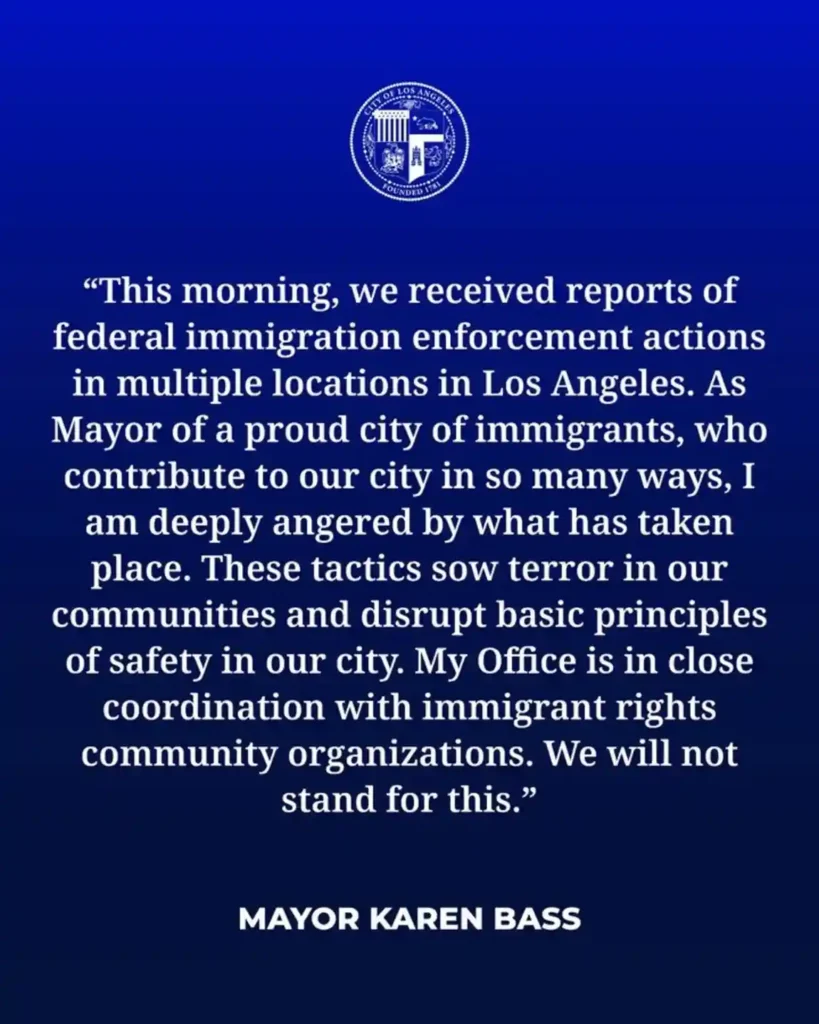At a glance, this may sound like just another chapter in the long fight over immigration enforcement — a story many Americans feel they’ve heard before.
It’s easy to be skeptical: political outrage, media spin, and emotional protests often cloud the basic facts. And in today’s polarized climate, it can be hard to tell what’s really driving the headlines.
But behind the noise of this weekend’s ICE raids in Los Angeles are real questions about government power, local vs. federal authority, and the rights of individuals—issues that affect more than just the immigrant community. They touch on the core of how law enforcement operates in American cities, and who gets to set the rules.
On Friday, U.S. Immigration and Customs Enforcement (ICE), with agents from Homeland Security Investigations (HSI) and the FBI, carried out coordinated operations at several businesses across Los Angeles. Nearly 45 individuals were arrested at seven locations, including Home Depot stores, a clothing warehouse, and a doughnut shop, according to advocates.
Federal officials say they were enforcing search warrants related to suspected employment of undocumented workers using false documents—offenses that remain illegal under federal law regardless of local politics.
Video footage shows agents escorting individuals with their hands tied, loading them into unmarked vans. At one protest site, agents used flash bangs to clear crowds as tensions escalated.
One man was deported to Mexico the same day, according to immigration attorneys, before his family could contact him.
Why this matters—even if you think immigration stories are overblown
This isn’t just about immigration. The heart of this fight is about how federal power is exercised in cities like Los Angeles, where local officials openly oppose mass deportations and where community trust in law enforcement is fragile.
When federal agents operate aggressively in a city whose leadership objects, it forces a clash over whether local communities have any say in how laws are enforced on their streets. It also raises transparency concerns: in this case, the Department of Homeland Security has yet to provide a detailed public account of the raids.
Whether you support tough immigration enforcement or not, the question is whether cities and states should have a meaningful role in determining how those laws get implemented locally—and how forcefully.
Why now? Why LA?
These raids come amid President Trump’s renewed push for visible immigration enforcement—a central plank of his 2024 campaign and current administration priorities.
But California, and especially Los Angeles, has long positioned itself as a “sanctuary” state. Local leaders argue that ICE’s tactics undercut public safety by making immigrant communities less likely to cooperate with police—even on non-immigration crimes.
Mayor Karen Bass and Sen. Alex Padilla sharply criticized the raids. So did LAPD leadership, who emphasized that city police were not involved in any way.

LAPD Chief Jim McDonnell reiterated that the department has followed a 45-year policy of not enforcing civil immigration laws—a policy meant to preserve community trust.

The human angle
These raids don’t just stir legal debates—they impact families in immediate, painful ways. Some individuals arrested were longtime residents with jobs and families in Los Angeles.
One man picked up at a Home Depot was deported before his lawyer could intervene. Advocates say similar stories are playing out behind closed doors as detainees move through the system.
At the same time, federal agents argue they were targeting employers suspected of knowingly breaking employment laws—a crime that often exploits vulnerable workers, documented or not.
The bigger question
At its core, this story raises a question that Americans across the political spectrum should care about:
Who decides how federal law is enforced on your city’s streets—and how much force is too much?
In a political environment where distrust runs high—toward both federal agencies and local leaders—these questions deserve clear answers.
For now, Los Angeles finds itself again at the center of a national fight over immigration, power, and the limits of government. Whether this latest clash leads to accountability or deepens division remains to be seen.


